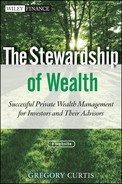The Rich and the “Faux Rich”
Another issue that tends to cause confusion in this regard is the confounding of two kinds of prominent families: the truly rich, that is, those who control very significant amounts of private capital, and the “faux rich,” those who merely enjoy extremely high incomes. The latter might eventually control significant capital, but the dynamic that drives their lives and their characteristic neuroses is the relatively sudden thrust from a middle-income (or worse) past to a very, very high-income present. Such people are more analogous to lottery winners than to the truly rich, and their typical patterns of behavior are similar to the dysfunctional practices of lottery winners.
There are very few ways in the United States or any other democratic society for anyone to legally earn a huge income, and in virtually every one of those sectors of the economy the jobs come with enormously high risk. Is the CEO of a Fortune 500 corporation really worth being paid hundreds of times as much as a factory worker? Maybe so, but many people will be skeptical, including many CEOs themselves. Worse, the job of any CEO can suddenly disappear, its occupant summarily fired, often for reasons wholly beyond the CEO's control. And along with the job, out the window go the high income and all the perks and the CEO's reputation. Private capital, on the other hand, if it is wisely managed (see Chapters 9 through 22, above), never goes away.
Let's compare two people we'll call Helen and Larry. In every sector of the economy, the incomes earned by the most successful people reflect not some extraordinary level of talent, but simply the local value of whatever talent exists. Let's begin by considering Helen, who is an exceptionally able administrative assistant to corporate executives (a person we would not long ago have called a secretary). Helen is organized, pleasant, diplomatic, reliable, and so on, and the executives to whom she reports during her career are very lucky to have her. Very few Americans are as good at their jobs as Helen is at hers. Unfortunately for Helen, there is only so much that her talents are worth—the local value of her talents as an executive assistant might allow her to lead a nice, comfortable lifestyle, but she will never become rich. In other words, Helen is a lot like most talented people—she will be successful and will enjoy her work, but her annual income will never make the front page of the Wall Street Journal.
Now we'll contrast Helen with another, roughly equally talented person. Larry is a television industry executive who has a specific talent, namely, the ability to anticipate what television shows Americans are going to like and watch. In the general scheme of things, this is a modest enough talent, roughly equivalent to Helen's. But Larry is lucky—the local value of his talent is enormous. The network pays Larry millions of dollars a year simply because the shows he has picked for the network tend to draw slightly more viewers than the shows other people have picked for other networks. This slight advantage means hundreds of millions of dollars in advertising revenue to Larry's network, so allocating a small percentage of that to keeping Larry happy seems like a bargain.
Meanwhile, Larry, a middle-class kid from Queens, has never seen so much money in his life. He spends it lavishly, so that everyone will know how important he is. Tiny slights—Larry was recently assigned a seat in the rear rows for a bonzo Hollywood opening, and not two weeks ago his regular table at Spago was occupied by a media mogul—wound Larry deeply, sending him into a rage. Larry routinely works 100-hour weeks, has been divorced twice, and is currently dating a gorgeous but brain-dead starlet. He would barely recognize his own children if they wandered into his office. What little spare time Larry has is spent with his personal trainer, trying desperately to remain buff in the face of advancing middle age.
But for all this, Larry is not the superficial twit he seems to be. He is simply a relatively ordinary guy who has suddenly been thrust into the position of earning a huge income and whose job, reputation, and salary are constantly in danger of suddenly going away. The grinding insecurity this engenders manifests itself in Larry's nauseating insistence on proving how important he is. But Larry is right to feel insecure. Sure enough, Larry's infatuation with modestly sexy sitcoms—his claim to fame in the industry—has overstayed its welcome. The public is tired of watching self-absorbed nincompoops exposing their neuroses at 9 p.m., and has turned its attention to reality shows. Caught completely off guard, his network's ratings plummet and Larry is summarily—and very publicly—fired. There went his high income, his power to green-light shows, his table at Spago—essentially everything that dominated Larry's life has disappeared in an instant. Helen, meanwhile, continues to climb the corporate ladder, getting herself assigned to ever-more-senior executives. And the truly rich, meanwhile, continue to be rich.2
